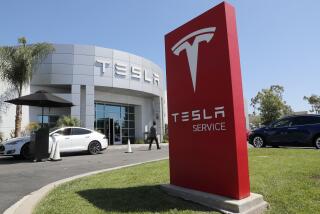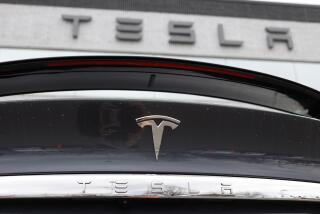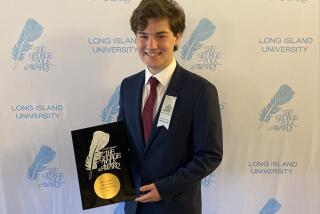Toyota attacks claim of defect found in electronics
- Share via
Months into its recall crisis, Toyota Motor Corp. launched a counterattack Monday, bringing out a panel of experts to debunk the claims of an academic who says he has found an electronic defect in its vehicles related to sudden acceleration.
In a presentation at the company’s Torrance operations center, five engineers disputed the findings of Southern Illinois University Carbondale professor David Gilbert, who claims he can produce an electrical fault in Toyota vehicles without its being detected by the vehicles’ diagnostic system.
Gilbert’s findings, if true, could bolster claims by some Toyota motorists that they experienced sudden acceleration without triggering a trouble code on the vehicles’ computers.
Chris Gerdes, director of the Center for Automotive Research at Stanford University, said the findings by Gilbert contain “no evidence of any real-world malfunction that the Toyota system can’t detect.” And Matthew Schwall, one of three engineers called in from testing firm Exponent Inc., called Gilbert’s tests an “unrealistic manipulation.”
Gilbert said through a university spokesman that he stands by his research and that he intends to visit facilities of Exponent next week to discuss its review of his research.
Until recently, Toyota has been largely on the defensive as allegations of sudden acceleration in its vehicles have prompted millions of recalls, congressional hearings and federal investigations. On Monday, the House Oversight and Government Reform Committee, in response to a Times article, asked Toyota to produce a copy of a memo from company employees that Toyota allegedly was risking safety in order to cut costs.
Through the first two months of the year, Toyota’s U.S. sales were down 12.4%, while its stock price has declined 13%since the company recalled 2.3 million cars for a sticking pedal problem Jan. 21.
And although the new strategy could help the beleaguered automaker vindicate itself from what it has characterized as unfair attacks, it also could open it up to further scrutiny, experts in crisis management said.
“It brings up the question with the consumer of whether to believe Toyota or not,” said Olivier Rubel, a professor at UC Davis’ Graduate School of Management who specializes in corporate decision making. “You don’t want to be in a communications war.”
On Feb. 22, Gilbert told ABC News that by connecting two wires in the electronic throttle system of a Toyota Avalon, then creating a small short, he was able to produce unintended acceleration without producing an error code in the car’s computer system or triggering a fail-safe mode.
The following day, he testified to Congress that his research raised questions about “the integrity and consistency” of Toyota’s electronic throttle control.
In response, Toyota asked Stanford’s Gerdes to re-create the testing on his own, had its own engineers prepare a report and paid Exponent to produce a 43-page study rebutting Gilbert’s findings. Toyota spokesman Mike Michels also pointed out that Gilbert’s research was “paid for by someone who is an advocate for trial lawyers.”
That statement was based on the fact that Gilbert had been commissioned, for $1,800 upfront and $150 an hour, to do the study by Sean Kane, president of Safety Research & Strategies. Last month, Kane acknowledged to Congress that he received financial support from five trial lawyers with pending litigation against Toyota.
The firm Toyota hired to study its electronic throttle system, however, also receives money for litigation work. Exponent receives millions of dollars a year from automakers for research used in litigation defense. Toyota has declined to state how much it is paying Exponent for its work.
Gerdes said Toyota did not pay for the research he presented Monday. But the Center for Automotive Research, which he directs, gets funding from Toyota and other automakers; these companies must pay at least $50,000 to be named affiliates and their logos are featured on its website.
ken.bensinger@
latimes.com
ralph.vartabedian@
latimes.com







